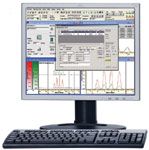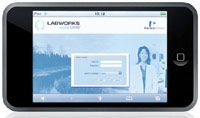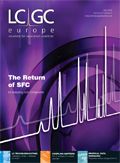Digital Update
Digital Update
GPC/SEC software
PSS has expanded the list of systems controlled by the company's WinGPC Unity, a macromolecular chromatography data system for GPC/SEC applications. Waters, Shimadzu and Dionex instruments have been added to existing controls for PSS SECcurity GPC systems, Agilent 1100/1200 systems and Tosoh EcoSEC systems. Mixed configurations, with instruments or detectors from other vendors, are fully supported to allow one data system for all GPC/SEC applications in the lab. As well as allowing data acquisition from instruments, independent of brand, the software adds powerful viscometry and light scattering detection as well as copolymer analysis, 2D chromatography and semi-preparative or HighSpeed GPC/SEC. Instrument control is added with the WinGPC Unity SystemPilot, which provides functions for traceability of measurements and for documentation of system performance.

1TADM lab analyser
The TADM Lab Analyser, a customized software tool, has been developed by apartis to provide TADM (Total Aspiration and Dispense Monitoring) measurement functions for STAR and STARlet users. According to the company the analyser allows users to easily visualize TADM curves and user-defined or pre-set guard bands and warning ranges live, per channel. The company claims that STAR and STARlet technicians can instantly and easily see TADM guard band violations from across the room, or check for any errors via user-defined automatic reporting or channel display upon return to the laboratory. Users are also able to review or compare selected saved channel curves and data statistically or graphically, via barcode ID, method, pipetting step, liquid class, instrument S/N, date and/or time range. From comparisons and built-in statistical tools, users can also self-optimize existing or user-defined guard bands and user-defined warning bands and alarms. The analyser is reported to be applicable in any blood testing setting as well as in drug discovery target validation.
Test methods to simplify mass spectrometry applications
Applied Biosystems and its mass spectrometry joint-venture partner, MDS Analytical Technologies, have announced the commercial availability of a new suite of test methods that, according to the company, simplify the use of mass spectrometry technology for food and water quality testing, forensic toxicology and clinical research. The iMethod Tests consist of 23 pre-configured and verified workflows that can be downloaded and shared by laboratories to conduct scientific analysis on mass spectrometry instruments. The tests are enabled by the two companies' chemical testing application, Cliquid 2.0 software for routine screening and quantitation, which enables analysis of compounds and contaminants on its triple quadrupole and QTRAP systems. Tests include a carbamate pesticide method, testing for illicit drugs, pharmaceutical residues, immunosuppressants and vitamin D, among others. The tests and software are part of a workflow solution supported by the companies' LC–MS–MS mass spectrometry systems.
LIMS with zero footprint web client
PerkinElmer has released LABWORKS LIMS version 6.1. This version is reported to deliver a laboratory information management system (LIMS) with a zero footprint web client. It can be effectively deployed with minimal user training and is designed to consistently perform on a wide variety of Web browsers. With foodLIMS, waterLIMS, greenLIMS and processLIMS packages, this system is designed to support the unique needs of laboratories, from pre-login sample organization through reporting and data distribution. A workflow that can be configurable allows laboratories to focus on only those process steps that are relevant to a sample lifecycle, allowing greater control over resources without changing the way the laboratory operates. Process-oriented laboratories, including those in water treatment, chemical and biofuels production, refineries and food processing plants, require LIMS solutions that optimize workflow and turn around time, while ensuring safety and quality. This software features LABWORKS WebTop, a zero footprint platform requiring no software installation on the mobile device and allowing the users on any available web browser to access product testing results when and where they are needed.

New Study Reviews Chromatography Methods for Flavonoid Analysis
April 21st 2025Flavonoids are widely used metabolites that carry out various functions in different industries, such as food and cosmetics. Detecting, separating, and quantifying them in fruit species can be a complicated process.
Quantifying Terpenes in Hydrodistilled Cannabis sativa Essential Oil with GC-MS
April 21st 2025A recent study conducted at the University of Georgia, (Athens, Georgia) presented a validated method for quantifying 18 terpenes in Cannabis sativa essential oil, extracted via hydrodistillation. The method, utilizing gas chromatography–mass spectrometry (GC–MS) with selected ion monitoring (SIM), includes using internal standards (n-tridecane and octadecane) for accurate analysis, with key validation parameters—such as specificity, accuracy, precision, and detection limits—thoroughly assessed. LCGC International spoke to Noelle Joy of the University of Georgia, corresponding author of this paper discussing the method, about its creation and benefits it offers the analytical community.












